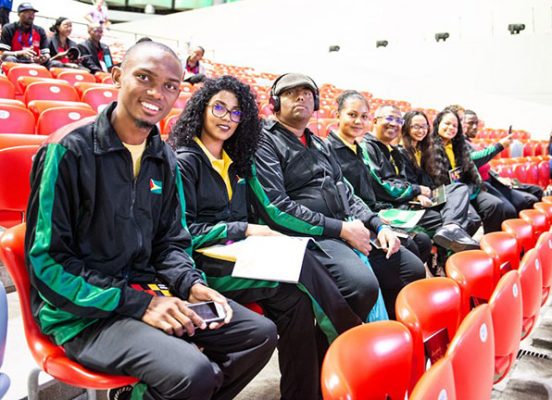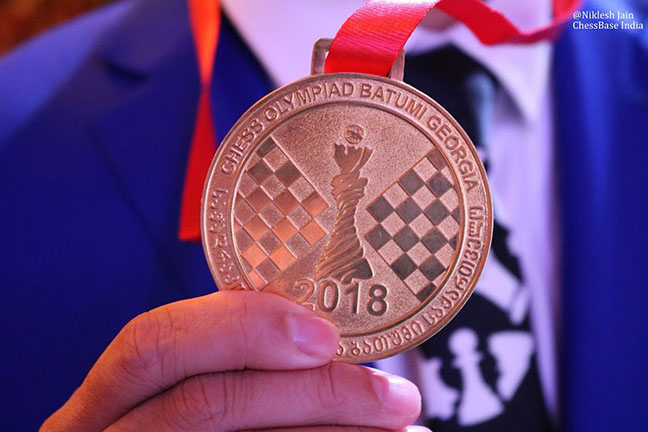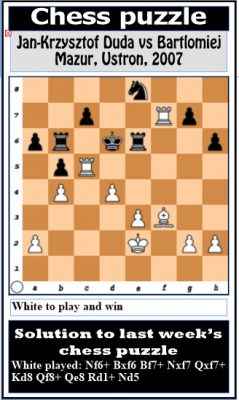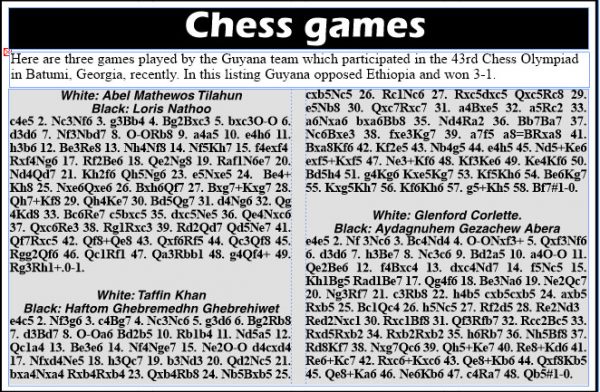 Guyana shone brightly at the 2018 Chess Olympiad in Batumi, Georgia. After the dust had settled, and the analyses were considered, we emerged with a triumph of hope for our foremost chess aspirants. It represented a noble start for those men and women who played their first Olympiad.
Guyana shone brightly at the 2018 Chess Olympiad in Batumi, Georgia. After the dust had settled, and the analyses were considered, we emerged with a triumph of hope for our foremost chess aspirants. It represented a noble start for those men and women who played their first Olympiad.
From all that I have heard and read, the experience was as educational as it was hectic. Each day, tactics had to be scrutinized and reworked to suit the occasion, depending on who the opponents were going to be. For example, in order to attract additional points for the championship, some competitors preferred to place their stronger players at the bottom of the playing boards, rather than at the top where they belonged. There is no unbreakable rule which determines that a player should participate according to his or her FIDE rating. Switching up the players meant they might not face their strongest competitors, and therefore could gain the desired points. One prominent team even trained two members to only play the black pieces. The strategy was effective.
It is my understanding the Guyana strategy was based on the following principle: boards 1 and 2 should go for the wins, and boards 3 and 4 should engineer draws. Naturally, if a victory became evident on boards 3 or 4, then by all means the player had to take it, as Loris Nathoo and Glenford Corlette did against Ethiopia.

Mobile phones were not allowed in the playing hall at the Olympiad, endorsing a rule which was implemented some years ago. It is felt that mobile phones can be used for cheating.
Before the Guyana Chess Federation followed a similar rule, and phones were allowed inside the playing hall, I experienced the strange case of my opponent leaving regularly for bathroom breaks whilst the game was in progress. This person knows who he is. It took me sometime to realize that the most accurate moves were being sought and executed upon my opponent’s return to the board. My recommendation for this type of dishonesty would be to place each participant’s phone in a basket on the table where the Tournament Director sits. In that way any sudden bathroom breaks would not include a phone. At the Olympiads, and similar international chess tournaments, mobile phones are not even allowed into the playing hall.
If Guyana intends to be progressively noticed for her improved chess abilities at future Olympiads, we have to play more tournaments and study the theoretical aspects of the game. This is not a personal idiosyncrasy. In all likelihood, this seems to be a plausible way of receiving titles and of polishing our chess image. In addition, we should practise adroitly with the clocks. If the Olympiad allows two hours per player to complete the game, it would be clearly unwise to conduct a local qualifying tournament with increased or decreased time. The idea is to practise under the right conditions. Suriname got the better of us at the Olympiad with only Taffin Khan on Board 2, bringing home the bacon in that match. Therefore, we have to consider Suriname as a serious training partner. We can ferry across the Corentyne River with ease , and the Surinamese can do the same for negotiated return visits.
A chess player is a thinking person. His/her singularity springs from his/her ability to discern the challenges that are not yet apparent to his/her opponent. He/She is a talented person, and, sometimes, is credited with using his/her innate ability for other purposes, and in other directions. That may be so. But to engage in successful tournament chess, it is necessary to practise incessantly, study the game, and wait to unleash your possibilities. That is how grandmasters are made.







